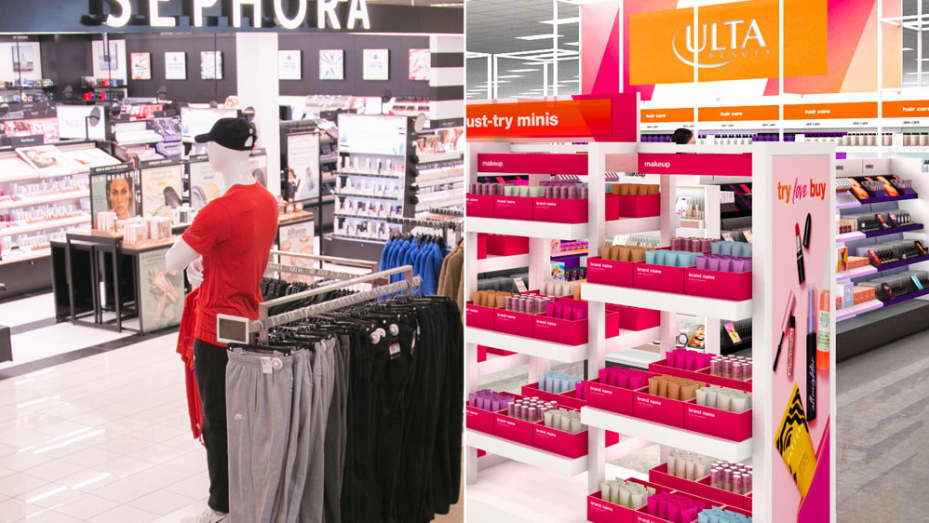
Beauty is always a big holiday category, but this year it’s poised to be even bigger.
Shoppers aren’t just looking for perfumes or candles to give to family and friends. They are eager to replenish makeup bags, refresh routines and buy new lipsticks to don at parties.
Consumers are also heading back to stores in larger numbers — a shift that could lift sales in a category that’s driven by in-person experiences. A trip to a beauty store offers the chance to try out an item before purchasing, talk to an expert or grab stocking stuffers and impulse buys after seeing colorful displays.
That is playing out at Target and Kohl’s stores, which will mark the first holiday season with a stepped-up focus and more square footage dedicated to lipstick, perfume, gift sets and more. Target has opened about 100 mini Ulta Beauty shops inside of its stores. Kohl’s has debuted about 200 Sephora locations. And more are coming soon.
At stake is a bigger slice of the beauty industry, as consumers turn to websites, big-box stores and specialty beauty shops for cosmetics instead of relying just on drugstores or department store beauty counters. Both off-mall retailers see the premium beauty shops as a way to drive more foot traffic, inspire impulse purchases and ultimately, boost sales across other departments. It’s also a chance for Target and Kohl’s to welcome back shoppers who might not have stepped foot in one since March 2020.
Ulta Chief Operating Officer Kecia Steelman said she expects sales this holiday season will reflect people’s desire to splurge on themselves and others and to get “glammed up more,” too. She said the beauty retailer made heavier buys of holiday-themed gift sets compared with last year.
“As we’re coming through this pandemic, people that are holed up are ready to get out and celebrate —celebrate for themselves and each other,” she said in an interview.
Beauty tends to see an uptick in sales around the holidays because it offers such giftable options with easy-to-buy sets, said Olivia Tong, a managing director of equity research at Raymond James focused on the beauty and personal care sectors.
Plus, as more families and friends gather over the holidays this year, she said, some people may invest a little more in getting ready — perhaps by springing for new eyeshadow, blush or a fragrance to spritz.
“In some cases, you might not have seen these people for a while,” Tong said. “And maybe you put in that extra little effort with respect to appearances.”
Bright outlook for a key time
Beauty is poised for a bright holiday season, according to estimates by The NPD Group. More than a quarter of U.S. consumers plan to buy a beauty product, according to the market research firm’s survey of more than 3,600 consumers in September about their holiday shopping plans.
The overall U.S. prestige beauty industry is expected to surpass pre-pandemic levels this year, too, according to NPD. Sales in the category are expected increase by 25% to 35% versus last year and top 2019 levels by low to mid single-digits. That category includes brands largely sold by department stores, beauty specialty stores or on their websites.
For beauty retailers, the fourth quarter is crucial. About a third of prestige beauty sales come from the holiday period, according to NPD.
Steelman described it as Ulta’s “Super Bowl” and “the most important quarter of the year.” Last year, for instance, the fourth quarter drove about 36% — or more than a third — of Ulta’s total sales for the year. In 2019, about 31% of its annual sales came from the three-month period.
[“source=cnbc”]
